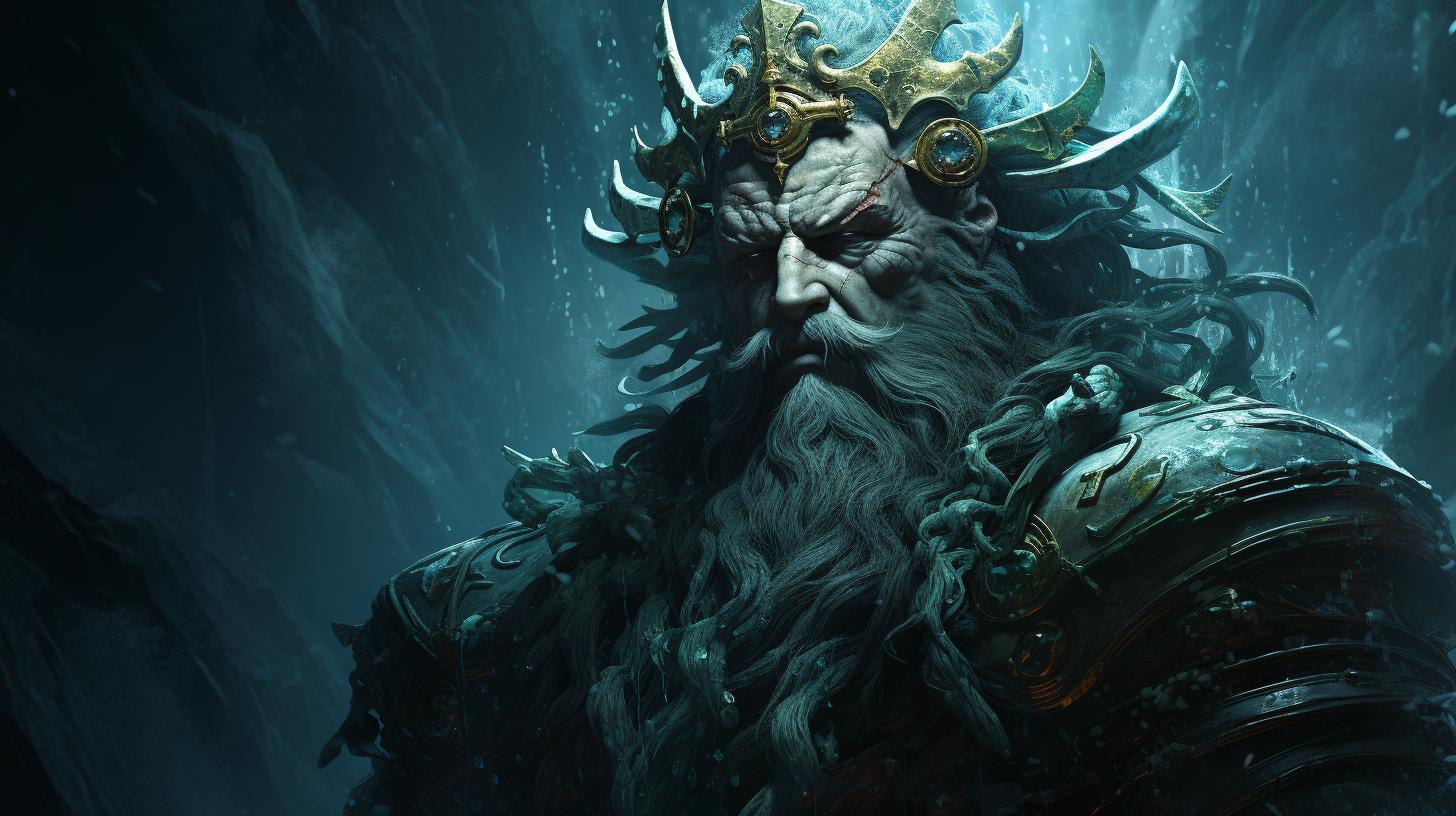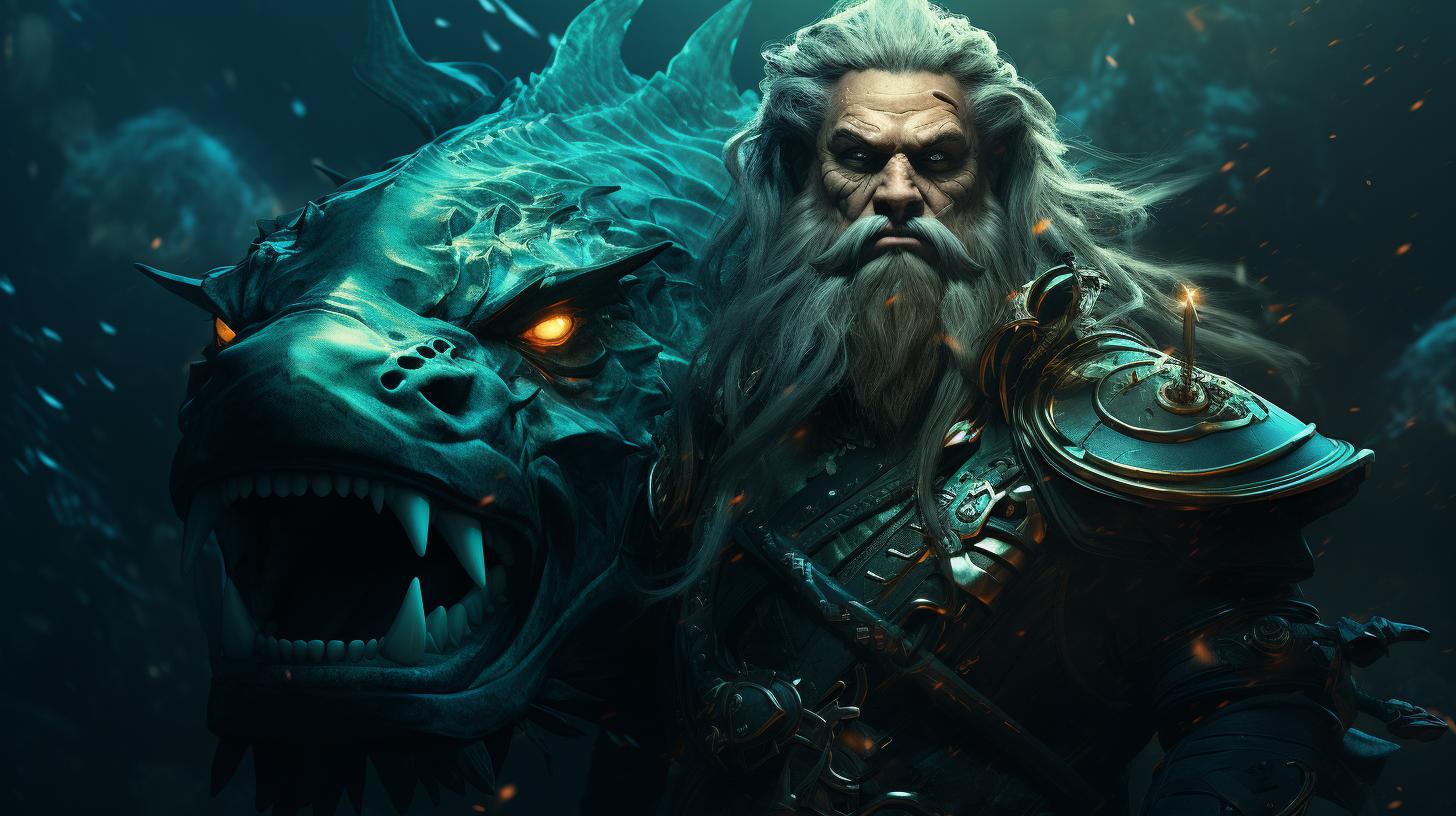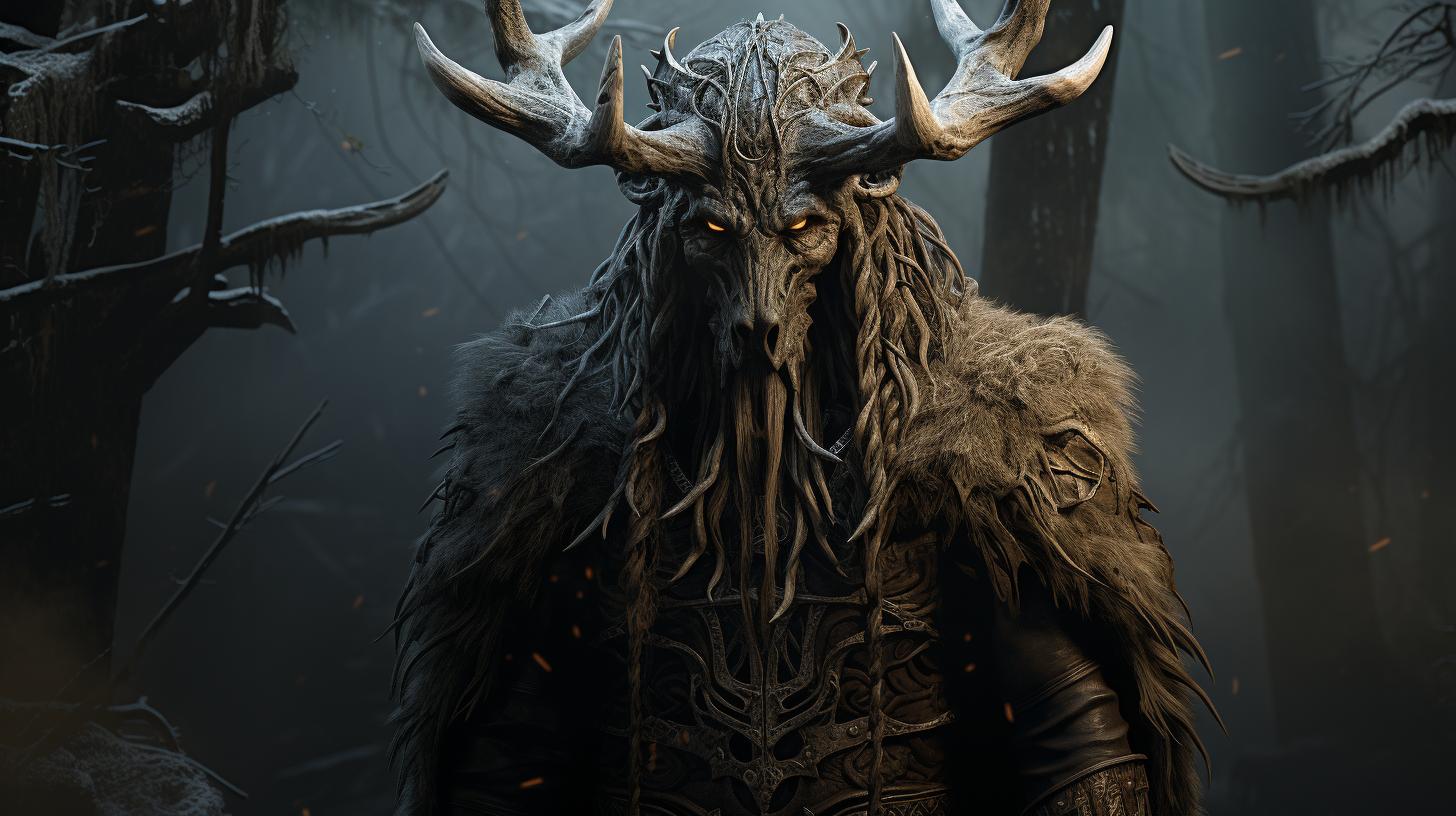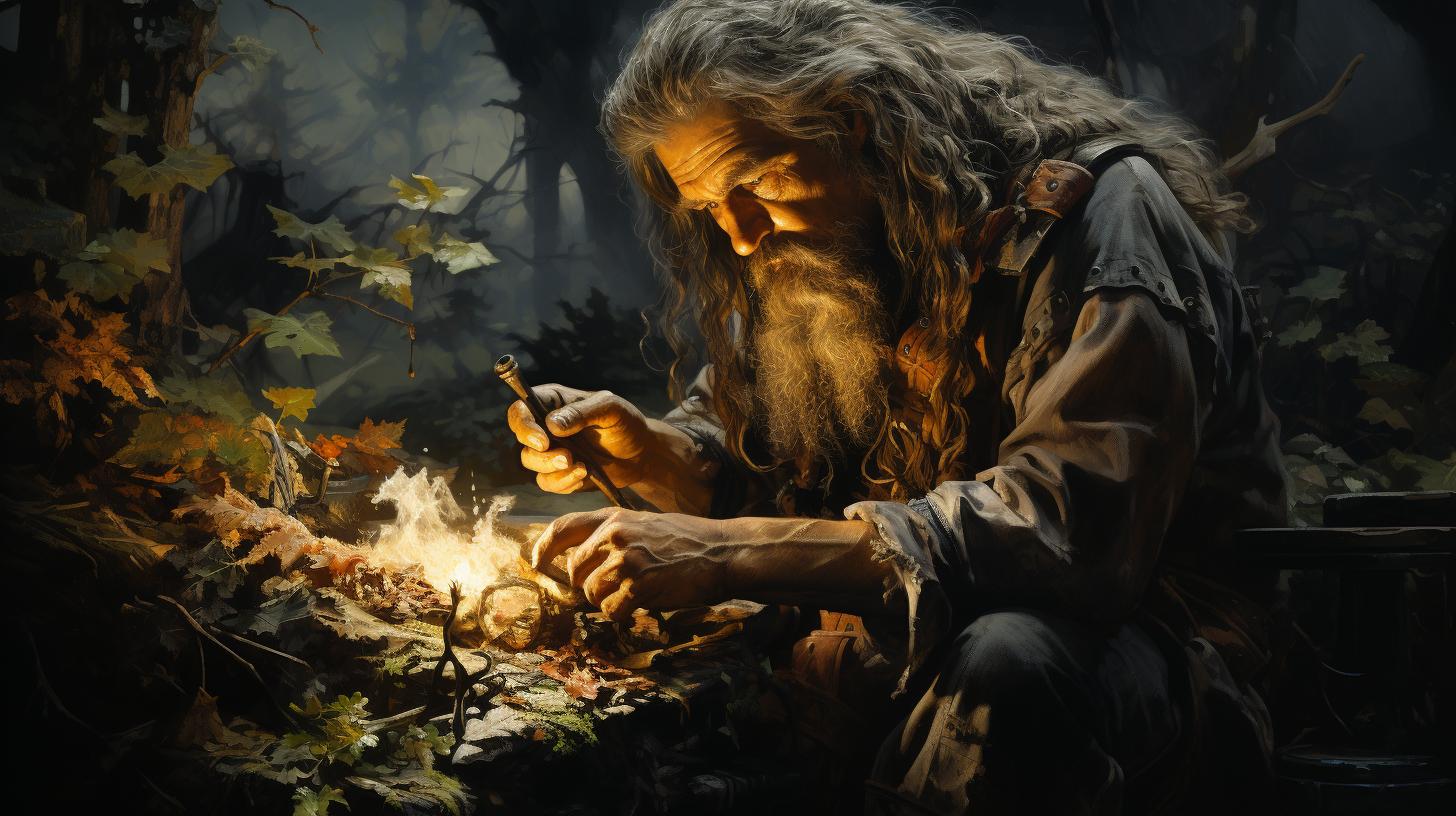Ahti Finnish God – The Origins of Ahti Finnish God

Ahti, also known as Nahti or Näkki, is the Finnish god associated with the sea and fishing. He is renowned as the king of waves and is often depicted as a bearded man dressed in foam, resembling a seal or walrus.
Ahti’s domain includes controlling the waves, bringing forth fish from the sea, and working closely with his wife, Vellamo, the goddess of water. As a healer, Ahti was also called upon in times of sickness.
He possesses the ability to transform into Näkki, a malicious horse. Additionally, Ahti is revered as the god of material wealth and resides in Ahtola with his family.
The Origins of Ahti Finnish God
The origins of Ahti Finnish God trace back to ancient Finnish mythology, where he is revered as the deity of the sea and fishing.
According to the legends, Ahti emerged from the depths of the ocean, embodying the power and vastness of the sea itself. His mysterious origins and association with water emphasize his connection to nature and the primal forces of the world.
Ahti’s existence predates recorded history, with ancient Finnish tribes passing down tales of his divine presence through generations. As a central figure in Finnish mythology, Ahti symbolizes the harmonious relationship between humankind and the natural world.
In this role, he not only provides sustenance through fishing but also facilitates the spiritual connection between individuals and the sea.
The stories surrounding Ahti’s origins vary across different regions of Finland, reflecting the diverse cultural interpretations of this revered deity.
Some legends describe him as a primordial being, born from the eternal waters that span the universe. Others portray him as a descendent of ancient sea creatures, embodying their strength and wisdom.
Regardless of his precise origins, Ahti Finnish God remains an integral part of Finnish folklore, capturing the imagination and reverence of generations. His presence permeates the traditions, rituals, and beliefs of Finnish people, highlighting the deep-rooted connection between humanity and the sea.
Ahti’s Role as the God of the Sea and Fishing
As the Finnish god of the sea and fishing, Ahti plays a vital role in the lives of the Finnish people. He holds the power to control the waves and ensures a plentiful supply of fish from the depths of the ocean.
Ahti’s influence extends beyond the physical realm, as he is also believed to bestow blessings on fishermen, guiding them to successful catches.
Ahti’s connection to the sea and fishing goes beyond mere control and guidance. He is regarded as a guardian and protector of those who venture out onto the water.
Fishermen pray to Ahti, seeking his favor and protection, as they rely on him for their livelihood.
Moreover, Ahti’s association with fishing expands into the realm of spirituality. He is believed to possess knowledge and secrets of the underwater world, which he shares with those who respect and honor him.
The fishing rituals and spells performed by the Finnish fishermen often involve invoking Ahti’s assistance and seeking his favor in the pursuit of bountiful catches.
Overall, Ahti’s role as the god of the sea and fishing holds immense significance in Finnish mythology. He is not only revered for his ability to control the waves and bring forth fish, but also for his guidance, protection, and spiritual connection to the underwater world.
Ahti’s Control over the Waves and Fish
Ahti, the Finnish god of the sea and fishing, possesses remarkable mastery over the waves and the aquatic creatures within. As the king of the waves, he commands the ebb and flow of the ocean, ensuring a bountiful source of fish for the fishermen.
In ancient Finnish folklore, Ahti is invoked during fishing spells and rituals to guide the fish towards the fishermen’s nets. With his divine influence, he brings abundant catches from the open sea and the depths of the ocean.
Fishermen seek his assistance, promising offerings of gold, silver, and other precious items in exchange for his aid in their endeavors.
It is through Ahti’s intervention that the unpredictable nature of the sea becomes more predictable, allowing fishermen to venture for their catch with confidence.
His control over the waves and fish establishes him as an essential figure in both the livelihood and culture of the Finnish fishermen.
Through his connection with the sea, Ahti plays a crucial role in shaping the prosperity of the Finnish coastlines, ensuring a sustainable supply of fish for the communities that depend on them.
His divine influence has been revered and respected for generations, as fishermen continue to call upon him for guidance and abundance.
Ahti’s Relationship with Vellamo, the Goddess of Water
Ahti, the Finnish god of the sea and fishing, shares a deep connection with Vellamo, the goddess of water. As husband and wife, they work together to control and nurture the aquatic realms.
Ahti’s domain over the waves and fish is complemented by Vellamo’s authority over the vast waters.
Their partnership represents the harmony between land and sea, as well as the interdependence of human life and the natural forces that sustain it.
Together, they ensure a bountiful catch for fishermen and offer protection to those who venture into the depths of the water.
Vellamo’s presence alongside Ahti in fishing spells and rituals highlights the importance of invoking both deities for a successful and fruitful fishing expedition.
The combined power of Ahti as the ruler of the seas and Vellamo as the mistress of the water enhances the chances of a prosperous catch and a safe return.
In Finnish mythology, Ahti and Vellamo are revered as a divine couple, an embodiment of the forces that govern the watery realms.
Their union signifies the sacred bond between humanity and the natural elements, reminding us of our reliance on nature and the need for its preservation.
Ahti as a Healer and Protector
Ahti, the Finnish god of the sea and fishing, not only controls the waves and brings forth fish, but also holds the power to heal and protect.
In times of sickness, ancient Finns would turn to Ahti for assistance. Through a healer’s intervention, they would seek to understand why Ahti was angered and implore him for forgiveness and the removal of illness.
Ahti’s role as a healer extended beyond physical ailments. He was often invoked alongside the goddess of the forest, Mielikki, to cleanse and cure diseases. This divine intervention was sought when cases were severe and required more than the skills of mortal healers.
Ahti held the ability to bestow blessings and restore well-being.
As a protector, Ahti guarded against malevolent forces, ensuring the safety of those who sought his aid. He watched over the lakes and oceans, shielding those who ventured into the waters from harm.
It is said that his gentle hand and benevolent spirit could bring tranquility to lakes lacking a protective presence.
Ahti’s healing and protective powers showcased his compassionate nature, demonstrating his willingness to aid those in need.
His influence as a deity of restoration and safeguarding continues to be revered in Finnish mythology.
Ahti’s Transformation into Näkki, the Malicious Horse
One intriguing aspect of Ahti Finnish god is his ability to transform into Näkki, a malicious horse. Näkki is not to be taken lightly, as he is known for luring unsuspecting individuals, particularly children, towards the water’s edge.
Parents warn their little ones to stay away, lest Näkki snatch them away.
The transformation into Näkki showcases Ahti’s diverse nature and highlights his role as a deity with both light and dark aspects.
It serves as a cautionary tale, reminding us of the power and unpredictability associated with the realms of water and nature.
This metamorphosis also signifies Ahti’s influence beyond his domain of the sea and fishing.
It reveals his ability to traverse different realms and take on various forms, demonstrating his divine authority and flexibility within the mythological pantheon.
Although Näkki is often seen as a mischievous and even dangerous figure, Ahti’s transformation into this malicious horse adds depth and complexity to his character.
It serves as a reminder that spirituality and mythology encompass a wide range of emotions and experiences, inviting us to explore the multifaceted aspects of the divine.
Ahti as the God of Material Wealth
Ahti, the Finnish god of the sea and fishing, is not only associated with the natural elements but also with material wealth.
His divine influence extends to prosperity and abundance, making him the deity of riches and treasures.
Ahti’s Association with Gold and Silver
Within Finnish mythology, Ahti is often referred to as the “golden king” or “king of silver.” He symbolizes precious metals and the prosperity they bring. According to legends, Ahti possesses vast treasures, including beautiful silver shoe laces and golden ornaments, which he bestows upon the faithful who seek his favor.
The Allure of Gold and Silver
Gold and silver have long held a significant place in human culture, representing wealth, power, and beauty. In Finnish folklore, Ahti’s association with these precious metals adds to his allure and mystique, elevating his status as a deity of material wealth.
Seeking Ahti’s Favor for Prosperity
People seeking prosperity or an abundance of riches would invoke Ahti, offering prayers and offerings to win his favor. It was believed that Ahti’s blessings could bring fortune and success in endeavors related to wealth and commerce.
Ahti’s Material Blessings
Ahti’s generosity extended beyond gold and silver. It was believed that those who gained his favor could receive not only material wealth but also divine blessings in various aspects of life, such as health, protection, and happiness.
- Prosperity in trade and commerce
- Abundance in harvests and agriculture
- Success in fishing and maritime endeavors
Ahti’s association with material wealth served as a reminder of the interconnectedness of nature and prosperity, showcasing his role as a provider and sustainer in the lives of the Finnish people.
Ahti as a Family Man in Ahtola
Ahti, the Finnish god of the sea and fishing, not only wields power over the waves and brings forth abundant fish, but he also embodies the essence of familial love and companionship.
In his divine realm of Ahtola, Ahti dwells alongside his wife, Vellamo, the goddess of water, creating a harmonious family unit.
Together, Ahti and Vellamo lead a family of water spirits, including their daughters and sons.
Their divine children inherit their parents’ affinity for the aquatic realm, embodying the beauty and enchantment of the underwater world. Ahti takes pride in being a nurturing father, ensuring his offspring’s wellbeing and granting them blessings to thrive in their watery domain.
While Ahti’s role as the god of the sea and wealth often takes precedence, his devotion to his family is an intrinsic aspect of his character. In Ahtola, familial bonds strengthen the divine realm, fostering unity and harmony among the water deities.
This portrayal of Ahti as a family man highlights the importance of familial connections and the depth of his divine love. It showcases his role not only as a powerful deity but also as a provider and protector for his kin, ensuring their happiness and prosperity in the realm of Ahtola.
Ahti’s Influence on Finnish Mythology
Ahti, the Finnish god of the sea and fishing, holds a significant place in Finnish mythology. Revered for his control over the waves and his ability to bring forth fish, Ahti is seen as a powerful deity who holds dominion over the aquatic realm.
In Finnish mythology, Ahti is known for his close association with water spirits and his role as a healer. He is often called upon for guidance and protection in matters related to the sea, fishing, and even sickness.
Ahti’s healing abilities are sought after during times of illness, where it is believed that his intervention can bring relief and recovery.
Not only is Ahti revered for his practical influence on fishing and healing, but he also holds a symbolic role as the embodiment of material wealth.
With his association with gold and silver, Ahti is seen as a god who can bring prosperity and abundance to those who honor him.
Ahti’s influence on Finnish mythology extends beyond his individual powers.
He is part of a divine family, with his wife Vellamo and their water spirit children. Their interactions and relationships reveal insights into the relationships between gods in the Finnish pantheon.
In conclusion, Ahti’s influence on Finnish mythology is vast and multifaceted. His control over the sea, his healing abilities, and his connection to material wealth make him a revered and complex figure in Finnish folklore.
Ahti’s Role in Fishing Spells and Rituals
Ahti, the god of the sea and fishing, holds a significant role in fishing spells and rituals in Finnish folklore. Fishermen seek his assistance to gather abundant fish from the open sea and depths of the ocean, guiding them into their nets.
To invoke Ahti’s aid, intricate rituals and spells are performed, combining prayers and offerings.
During these rituals, fishermen make promises of gold, silver, and other precious items such as beautiful silver shoe laces or socks, in exchange for Ahti’s help.
These offerings symbolize gratitude and respect for the bountiful harvest of fish they hope to achieve.
Through these fishing spells and rituals, Ahti is believed to have the power to influence the movement of fish and ensure a successful catch.
Fishermen deeply value his support as they rely on the sea for their livelihoods.
Ahti’s association with fishing rituals is a testament to the strong connection between Finnish culture and nature.
These age-old traditions demonstrate the reverence and reliance of individuals on divine forces for their sustenance.
Ahti’s role in fishing spells and rituals showcases his influence in the lives of the Finnish people, maintaining the balance between human existence and the abundant resources of the sea.
Ahti’s Connection to Water Spirits
Ahti, the Finnish god of the sea and fishing, holds a strong connection to the spirits of the water. As the ruler of the waves, Ahti has the power to control and communicate with the lesser aquatic spirits.
These spirits, known as water nymphs or mermaids, play a significant role in Finnish mythology.
In Finnish folklore, water spirits are believed to inhabit lakes, rivers, and other bodies of water.
They are often depicted as enchanting beings, captivating humans with their beauty and melodious voices. It is said that Ahti has the ability to grant a benevolent spirit to a lake that lacks one, ensuring its vitality and fertility.
These water spirits are highly respected and revered, as they are seen as guardians and protectors of the aquatic realms. Fishermen and sailors would often seek the favor of Ahti and the water spirits to ensure safe journeys and successful catches.
They would perform rituals and offerings to gain the spirits’ favor and secure their protection.
In Finnish culture, the connection to water spirits runs deep, reflecting the importance of water in their lives.
Ahti’s association with these spirits highlights his role not only as a deity but also as a mediator between humans and the mystical forces of the water.
class=”last”>As we delve deeper into the realm of Ahti Finnish god, we uncover the fascinating legends and traditions surrounding his connection to the water spirits.
Ahti’s Simultaneous Role as a Language Controller
Ahti, the Finnish god of the sea and fishing, holds a unique position in mythology as a language controller. While primarily known for his dominion over the waves and his connection to fishing, Ahti also possesses the ability to influence and shape language.
According to Finnish folklore, Ahti is believed to have the power to imbue words with hidden meanings and symbols. It is said that he controls the subtle nuances and intricacies of language, allowing him to communicate with both mortals and divine beings through cryptic messages.
Furthermore, Ahti’s linguistic prowess extends to the realms of poetry and song. He is regarded as the patron of bards and storytellers, inspiring them to craft eloquent verses that capture the essence of Finnish culture and traditions.
- Ahti’s linguistic influence can be seen in the rich tapestry of Finnish folklore and mythology, with stories and legends carrying his linguistic imprint.
- He is known to have gifted mortals with riddles and puzzles, encouraging them to unlock the deeper meanings behind his words.
- Through his linguistic control, Ahti fosters a sense of curiosity and intellectual exploration, urging individuals to delve into the secrets hidden within language.
Ahti’s simultaneous role as a language controller highlights the multidimensional nature of his divinity, adding yet another fascinating aspect to his already complex character.
.




















